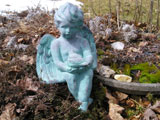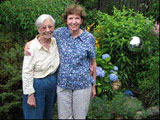Whole Home Resource
Interiors

The Whole Home
We all need a Garden Angel
Last fall I read the articles about “putting your garden to bed”, then I didn’t do it. In October I was reveling in late roses, still-blooming snapdragons, thriving eggplant, and a bumper crop of arugula.

When I returned home after a long trip in November, I convinced myself the unpruned hydrangeas would add “winter interest” to the garden. I won’t mention the sculptural quality of wire tomato cages in the snow.
I’ve placed one of my gardens near the house so I would tend it more often. But what I see from my windows are the effects of my neglect, much too close to the house.
The other day I reread a favorite gardening book, Eleanor Perényi’s Green Thoughts. Now I feel even worse. By not doing my fall chores I’ve probably weakened my perennials and encouraged disease. I did more research. I determined my hydrangeas are “mopheads” or H. macrophylla, and learned they should have been pruned right after they bloomed. I’m even farther behind than I thought.
I called Eileen Scalli and John Badgewick of Badgewick Design in Lyman and asked: “What do I do now? How do I make amends to my gardens?” The first thing Eileen said made me feel a little better: “These unpredictable winters are not giving us the usual protective snow cover, so last fall I pruned many of the perennials only half as much as I used to.”
She told me the worst thing I can do is to assuage my guilt by rushing out and working in a wet garden. Only after the garden dries out can I clear the debris gently with a bamboo or plastic (never metal) rake.
While I’m impatiently waiting for the soil to dry? Eileen says go buy a flat of pansies to pot—just don’t risk damaging the garden plants and spreading disease by getting into the garden too early.
What about my leftover tomato plants? Clean the area thoroughly, and to prevent spread of disease don’t put the plants or leftover fruit in the compost pile. She insists I not plant tomatoes in that spot again this year.
The hydrangeas? Trim only the obviously dead ends so I don’t remove the buds. Same with the untrimmed hedge of rosa rugosa or I’ll get no flowers this year. John Badgewick says, “When in doubt, don’t touch it.”
I’m determined to do better this coming fall. At least I’m physically able to get out there and do the work. But I feel for those older gardeners who can no longer keep up with much-loved gardens.
Fortunately there are Garden Angels. Seriously.

Garden Angels are Master Gardeners, trained by the University of Maine Cooperative Extension, who volunteer to assist gardeners no longer able to physically care for their garden and who cannot afford to hire help.
What happens when a Garden Angel appears? Says one lucky person, “I had to eventually give up all gardening. Soon I was looking at nothing but weeds, it was depressing. Now I see flowers and plants from my window and when I sit outside. All is a lot better with the world.”
Last year 61 Garden Angels assisted people in 29 towns in York and Cumberland counties. Unfortunately the need for Garden Angels is much greater than the supply, and there is a waiting list for the program. Since 1982, 404 Master Gardeners have been trained, and Amy Witt, a Horticulturist with Cooperative Extension, produces a new crop every spring. This May 33 new Master Gardeners will be certified. For information on Master Gardeners, Amy is at 780-4205.
It’s inspiring to know those Garden Angels are out there getting their hands dirty for such a good cause.
As I write this I’m already behind on my early spring chores. The sap is running, have I waited too long to prune the apple trees? Eileen says it’s not too late, get out there.
